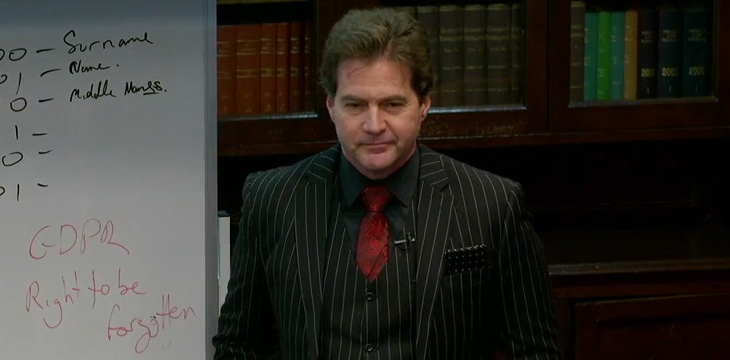|
Getting your Trinity Audio player ready...
|
In the final session of the first “The Bitcoin Masterclasses,” Dr. Wright invited groups to talk about their discussion topics related to what they’ve learned and outlined some of the applications made possible by blockchain technology.
Group discussions: Ideas, challenges, and solutions
Group 1
The first group talked about potential self-attestation, dealing with conflicting data (errors) in a Merkle tree by utilizing schemas, linking things like debit cards and photographs, and dealing with changing attributes such as religion, new languages learned, job history, etc.
“How do you think about separating your government-attested versus your personal identity?” Dr. Wright asks. The group replies that having multiple of them and using selective disclosure could help with this.
Dr. Wright points out that governments never solve these problems. It’s up to developers and entrepreneurs to solve this, and then governments will step in and set legal standards.
Group 2
The second group notes that some attributes could be self-certified while others would need entities like certificate authorities to sign off on them and associated changes. An example of the first would be an email address, whereas an example of the second would be a passport or driver’s license.
Once again, it’s possible to share some information while keeping other information private using selective disclosure. This would reduce the amount of information organizations hold and, therefore, would reduce the impact of data breaches. It also makes it possible for the likes of marketing companies to send information to potential customers without knowing who they are or anything else about them.
On a slightly different topic, Dr. Wright discusses how, as long as we randomize addresses, IPv6 is more secure than IPv4. It would make things like port scanning infeasible due to the sheer volume of IP addresses generated. As with many of Dr. Wright’s thoughts on security, this works mainly by making it economically unfeasible to conduct such attacks.
Group 3
Group three focused on data types and attributes that could change over time. For example, nationality at birth is something that could be on your original birth certificate but may change. Updated attributes should always have anchors back to the originals.
There’ll also be a need for multiple entries in a given Merkle tree, covering things like bank accounts. They believe that the left-hand side of a tree could track actual entries while the right could record the number of entries.
This group also thought about more modern data types, such as payment handles on BSV or social media handles.
This group also considered that data could be attested to from several sources, making some data more trustworthy than others. For example, an address might be attested to by multiple authorities, making it more reliable than other data types linked to an identity.
Group 4
Group four discusses the potential for Merkle trees to be linked, allowing others to attest certain attributes of our identity. For example, a family member might attest to our relationship with them, creating a web of trust. This could help clubs, leagues, and trusts figure out who’s trustworthy.
We could also link miscellaneous attributes to our identity, such as attending The Bitcoin Masterclasses, taking certificates, etc. Other attendees and members of the community could sign that you did indeed attend. Subtrees could be used to track events, keeping them separate from one’s main tree.
For the true potential of all of this to be realized, a standard needs to be created, and that standard needs to be adopted. This would allow entities like the Home Office to use keys to verify the authenticity of documents linked to one’s identity. Dr. Wright acknowledges that it will take a long time for all of this to roll out, but in 10-20 years, many of the security vulnerabilities we face today will be solved.
Group 5
The fifth group starts by saying self-attestation could come first, and attestation by authorities could follow. Multiple notaries could attest to each entry. They also thought of donor cards, stating that there are plenty of use cases related to a person’s intentions and eventualities; a will would be one example of that.
“Does a notary need to be a government function?” Dr. Wright asks. He says that, in the U.K., they don’t have to be. There are both government and private notaries who could sign off on things of this nature.
Application and implementation
Before the break, Dr. Wright looks at some potential applications for all of this. For example, we could comply with KYC checks for things like exchanges without giving them custody of copies of our passports and personal documents. This is the reason they “basically call me the antichrist in Silicon Valley,” Dr. Wright smiles. Data is the new oil, and if we control our own data, companies like Twitter, Meta/Facebook (NASDAQ: META), Google (NASDAQ: GOOGL), and Palantir won’t have an easy way to make money.
Dr. Wright points out that if any of this is to become a reality, we’ll have to implement it. He explained that the technology already exists and, in some cases, is decades old. The blockchain is the newest thing (2008).
Dr. Wright ends the Masterclasses by discussing the implications of a more private world with blockchain-based identity. From ignoring and drowning out trolls on social media, to better record keeping to a reduction in fraud and financial theft, a better, more honest, and transparent world is possible.
Watch: The Bitcoin Masterclasses with Craig Wright – Confidentiality, Privacy, Anonymity, Party to Party
Recommended for you
Circle (NASDAQ: CRCL) soared in 2025 thanks to U.S. ‘regulatory clarity,’ but can this momentum survive a ban on crypto

 02-26-2026
02-26-2026 




